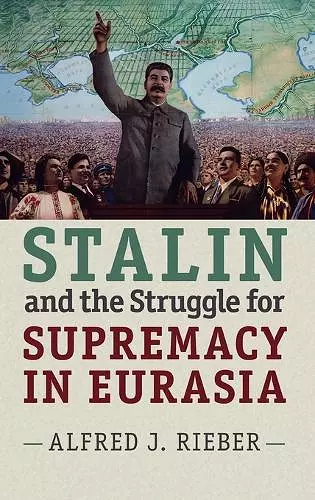Stalin and the Struggle for Supremacy in Eurasia
Format:Hardback
Publisher:Cambridge University Press
Published:27th Aug '15
Currently unavailable, and unfortunately no date known when it will be back
This hardback is available in another edition too:
- Paperback£25.99(9781107426443)

This is a major re-evaluation of Soviet foreign policy in the Eurasian borderlands from the Revolution to the Cold War.
Following the fall of the great Russian, Habsburg, Iranian, Ottoman and Qing Empires in the early twentieth century, this book explores the successor states that emerged in their wake and how the Soviet Union renewed the struggle over the borderlands through to the end of the Second World War.This is a major new study of the successor states that emerged in the wake of the collapse of the great Russian, Habsburg, Iranian, Ottoman and Qing Empires and of the expansionist powers who renewed their struggle over the Eurasian borderlands through to the end of the Second World War. Surveying the great power rivalry between the Soviet Union, Nazi Germany and Imperial Japan for control over the Western and Far Eastern boundaries of Eurasia, Alfred J. Rieber provides a new framework for understanding the evolution of Soviet policy from the Revolution through to the beginning of the Cold War. Paying particular attention to the Soviet Union, the book charts how these powers adopted similar methods to the old ruling elites to expand and consolidate their conquests, ranging from colonisation and deportation to forced assimilation, but applied them with a force that far surpassed the practices of their imperial predecessors.
'In this thorough study, Rieber analyzes the struggle for control of Eurasia's borderlands from the collapse of the Romanov, Habsburg, Ottoman, Qing, and Persian empires through the end of WWII. He focuses on Stalin, emphasizing the ways in which the Soviet leader's foreign policy echoed approaches of his imperial predecessors. Stalin was a 'man of the borderlands', shaped by his experiences growing up in Transcaucasia and building a revolutionary state on the ruins of a multiethnic empire … 'Stalin's pragmatism', writes Rieber, 'was the pragmatism of a Marxist-Leninist tempered by his grasp of the historical foundations of Russia's status as a great power'. Summing up: highly recommended. Upper-division undergraduates and above.' M. A. Soderstrom, Choice
'Beautifully written and richly documented … based on many archival materials made available in the post-Soviet era … Those with some knowledge of Soviet domestic and foreign policies will benefit the most from this book, but even those lacking a background in Soviet affairs would still benefit from reading it. It is an extremely timely work providing an understanding of the turbulent relations of Russia and the USSR with its neighbors, including Ukraine and, in that regard, provides an important tool for helping us understand Russian-Ukrainian relations today.' Nathaniel Richmond, The Russian Review
'This is an ambitious and overarching reinterpretation of Stalin's domestic and foreign policies - or actually the connections between the two - from the revolution and civil war periods through World War II and the dawn of the Cold War … Rieber's book provides some insights and historical background to the current Kremlin's profound and clearly long-standing fear of hostile states on its periphery, and the belief that a ring of friendly buffer states around Russia are vital to the security of the state.' Paul Stronski, Slavic Review
'Rieber's elaboration of the borderlands thesis in Stalin and the Struggle for Supremacy in Eurasia is a tour de force. The problem is that its brilliance dazzles as well as illuminates.' Geoffrey Roberts, H-Diplo
'Stalin and the Struggle for Supremacy in Eurasia is a very rich text and readers from many fields and area studies will find useful information to mine.' David Wolff, H-Diplo
- Winner of Pushkin House Prize 2016
ISBN: 9781107074491
Dimensions: 235mm x 158mm x 26mm
Weight: 740g
429 pages